Obamacare

I AM A FAMILY PHYSICIAN in Cleveland. For more than two decades, I have cared for lower-income families whose health struggles were made worse by their inability to afford private health insurance or to qualify for publicly funded health insurance through Medicaid or Medicare. Very few of their employers offer health insurance. This results in unaffordable medications and treatments, poor control of chronic illnesses, and avoidable complications from these illnesses.
The Affordable Care Act (ACA) of 2010 represented a sea change in the lives of my patients. They benefitted from two major health-insurance expansions: individual health-insurance exchanges, with subsidies to help middle-income families buy private insurance, and an expansion of Medicaid.

A judge on Wednesday refused to block President Donald Trump's decision to end subsidy payments to health insurers under Obamacare, handing Trump a victory against Democratic attorneys general who have regularly challenged the president's policies in court.

Stymied in Congress by the failure of Senate Republicans to pass legislation to dismantle Democratic former President Barack Obama's signature domestic policy achievement, Trump's executive order marks his administration's latest effort to undermine the 2010 law without action by lawmakers.

"The Trump administration just took direct aim at birth control coverage for 62 million women," Planned Parenthood Federation of America President Cecile Richards said in a statement.
"With this rule in place, any employer could decide that their employees no longer have health insurance coverage for birth control," Richards added

The Graham-Cassidy-Heller-Johnson ACA repeal bill is the most radical and most disruptive plan to reorder one-sixth of the U.S. economy, in no small part due to the rush to pass something, anything that would fulfill the 7-year Republican promise to “repeal and replace Obamacare” ahead of a critical Sept. 30 deadline this Saturday. On Oct. 1 a new fiscal year starts for the U.S. government, forcing the GOP to start over with the complex budget maneuvering that allows them to pass a bill with only 50 votes in the Senate rather than the 60 that are generally required.

Senate Republicans narrowly agreed on Tuesday to open debate on a bill to repeal Obamacare, but the party's seven-year effort to roll back Democratic President Barack Obama's signature healthcare law still faces significant hurdles.
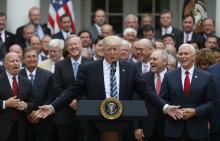
President Donald Trump pleaded with Senate Republicans on Monday to "do the right thing" on health care and allow debate to begin on a measure to repeal and replace Obamacare. The Senate is expected to vote on Tuesday on whether to begin debating a health care overhaul, although Senate Majority Leader Mitch McConnell (R-Ky.) has not specified which version of the bill the senators will vote on.

As people of faith who believe that concern for the health of our fellow children of God is mandated by our Savior Jesus (“I was sick and you took care of me” – Matthew 25:36) this is a time to give thanks to God. We are grateful that wisdom and compassion have, at least temporarily, triumphed over cynicism and greed.

A seven-year push by U.S. Republicans to dismantle the Affordable Care Act and kill the taxes it imposed on the wealthy will reach a critical juncture on Thursday when Senate Republican leaders unveil a draft bill they aim to put to a vote, possibly as early as next week. Senate Majority Leader Mitch McConnell and his lieutenants have worked in secret for weeks on the bill, which is expected to curb Obamacare's expanded Medicaid help for the poor and reshape subsidies to low-income people for private insurance.
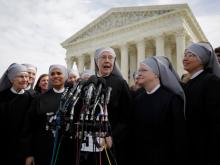
While not yet final, the regulation appears intended to let employers avoid providing birth control coverage if they object for any reason — an expansion of the original effort to exempt those with religious objections. As a result, abortion rights groups warn that up to 55 million women could lose free birth control coverage — something that saves them $1.4 billion annually.

The talk — a surprise for all in the audience — recapitulated the key themes of the Argentinian pope’s view of the human person: We are all related and interconnected; scientific and technological progress must not be disconnected from social justice and care for the neighbor; and that the world needs tenderness.
I am a scholar of modern Catholicism and its relations with the world of today. From my perspective, there are two essential elements of this talk that are important to understand: the message of the pope and his use of the media.

Overall, states would be forced to absorb $880 billion in Medicaid cuts to prevent the reduction or elimination of Medicaid services, something states are in no position to do according to governors from both parties. The bill would cut almost $900 billion from Medicaid over ten years, mostly to pay for changes that would benefit high-income people and corporations.
And in a morally shocking move, it is not just the poor, but the older and sicker poor people who will fare the worst under the new law.

If you don’t need or want insurance, some ask, why should you have to pay for other people’s coverage?
I know people who think this way, and they resent having the government obligate them to pay into the system.
Understanding that many Americans struggle and pay a high cost under the Affordable Care Act, we cannot really blame some for holding this position. But responsible citizenship compels us to take a broader view.
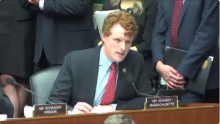
During Wednesday night's heated debate over the GOP's proposed replacement to the Affordable Care Act — which ultimately passed the House Ways and Means Committee early Thursday morning — Rep. Joe Kennedy III (D-Mass.) quoted Matthew 25 to rebuke Speaker Paul Ryan's description of the measure as "an act of mercy."

This time of crisis may also be a time of opportunity for people of faith, as the Matthew 25 Pledge and other calls to action are asking. Of course, U.S. faith-based activism played a critical role in the abolition movement, the labor movement, the civil rights movement, and many other historic efforts to fulfill the gospel message. And Trump’s unlikely ascendance to the presidency is prompting some social movement experts to point back to the faith community for next steps.
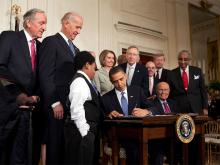
Bishops will examine proposals to amend or replace Obamacare but said that “for now that a repeal of key provisions of the Affordable Care Act ought not be undertaken without the concurrent passage of a replacement plan that ensures access to adequate health care for the millions of people who now rely upon it for their wellbeing.”

For much of its long history in the U.S., the Catholic Church was known as the champion of the working class, a community of immigrants whose leaders were steadfast in support of organized labor and economic justice – a faith-based agenda that helped provide a path to success for its largely working-class flock.
In recent decades, as those ethnic European Catholics assimilated and grew wealthier, and as the concerns of the American hierarchy shifted to battles over moral issues, such as abortion and gay marriage, traditional pocketbook issues took a back seat.
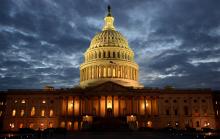
The U.S. Senate voted 51 to 48 in the early hours of Jan. 12 to begin the process of repealing major portions of the Affordable Care Act, also known as Obamacare. The vote went on for seven hours, as Senate Democrats attempted to build on growing unease among House and Senate Republicans over repealing major provisions of the ACA without a repeal in place. Ultimately, only Sen. Rand Paul (R-Ky.) joined the Democrats in voting against, and the resolution was approved.
Last night’s hours-long late night vote is known as a “vote-a-rama,” a long series of back-to-back votes in the Senate. Though atypical, it’s become a more common practice for major votes in the Senate.

I sat on the first wooden pew of the Metropolitan AME Church in Washington, D.C., on New Year’s Eve, with 500 faithful from across the country and thousands who watched online, to worship, testify, and encourage each other.
We came together in the tradition of the 1862 “watch night” service, when enslaved and free African-Americans, abolitionists, and others awaited news that the Emancipation Proclamation would become law and would free black people living in the South. We came together also in the tradition of Jesus, who told his disciples to “keep awake” while he prayed on the night before his crucifixion.
